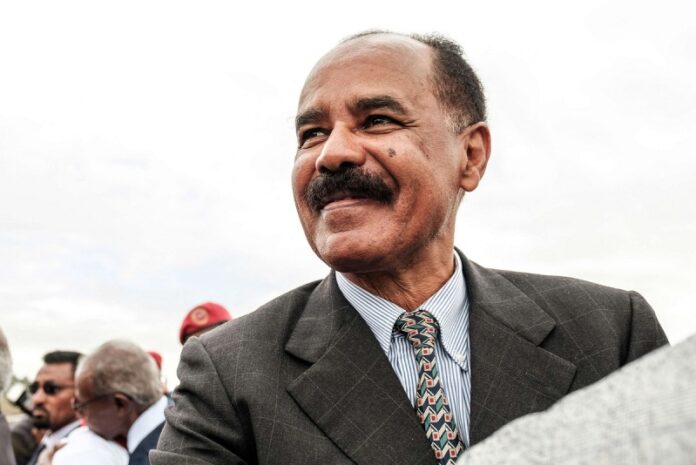Asmara – Eritrean President Isaias Afwerki has threatened war to block Ethiopia’s ambitions of gaining access to the Red Sea. This unexpected escalation may be linked to regional actors allied with Asmara attempting to pressure Ethiopia following its announcement of the completion of the Grand Ethiopian Renaissance Dam (GERD) and the issuing of invitations to attend its official inauguration — an act widely seen as a provocation against countries such as Sudan and especially Egypt.
Afwerki’s use of strong language has revealed potential for escalation in the Horn of Africa and the eruption of a long-simmering crisis. If Eritrea moves beyond rhetoric, this could signal the onset of a war that has loomed over the two countries for years and has previously been contained through various means.
However, observers argue that the current regional situation does not permit a new war, and no party — including Eritrea — has anything to gain from such a conflict. They suggest that Afwerki’s remarks may instead aim to return him to the spotlight, after having lost much of the influence he once held. They point out that Eritrea had previously signed a reconciliation agreement with Ethiopia, and it would not serve its political or economic interests to dismantle that deal now.
Afwerki warned Ethiopia against war, describing its aspiration to reach the Red Sea as “reckless.” He stated, “If Ethiopia believes it can overwhelm Eritrean forces through human-wave attacks, it is mistaken.” He cited the difficulty of securing the shared border and Ethiopia’s large population of over 100 million people, as well as its complex ethnic divisions and worsening economic crises.
In an interview with Eritrea’s state-run Eri-TV, Afwerki said, “Before dragging the Ethiopian people into unwanted wars or using them for political purposes, the country’s internal problems should first be addressed,” as though Eritrea itself were free from its own internal tensions, or insulated from the conflicts and instability affecting neighboring countries.
Afwerki’s firm stance appears to be a preemptive move against any possible Ethiopian efforts to reclaim access to the Eritrean port of Assab, amid Addis Ababa’s persistent drive for a maritime outlet and the recent faltering of a memorandum of understanding with Somaliland on the issue.
The central government in Mogadishu has opposed the deal with Somaliland, and Egypt has publicly supported Somalia’s rejection of its military and technical implications. Turkey has become involved by initiating negotiations between Mogadishu and Addis Ababa, which have so far led to the suspension of the agreement and a pledge by Ethiopia to recognize Somalia’s territorial integrity while seeking a consensual maritime access solution.
Afwerki’s threats came concurrently with a statement by Egyptian President Abdel Fattah el-Sisi on Sunday, in which he reaffirmed that the waters of the Nile River are a matter of “national security” for Egypt, during a meeting with U.S. CENTCOM Commander General Michael Kurilla.
On Tuesday, Sisi expressed appreciation for former U.S. President Donald Trump’s efforts to reach a fair agreement on the GERD. Trump declared that Washington is actively working to resolve the dam issue, saying, “This problem will be solved very quickly.”
Analysts note that Afwerki, who maintains strong relations with Egypt and aligns with Cairo’s opposition to Ethiopia gaining maritime access at any cost, fears the rising influence of Addis Ababa in the Horn of Africa. Such a shift could negatively impact Eritrea’s already fragile internal situation and its unstable relationship with Ethiopia.
These observers argue that the Eritrean president is attempting to draw a red line against Addis Ababa, especially if Ethiopia’s talks with Somalia fail and it decides to refocus its maritime ambitions toward Eritrea.
A bloody war erupted between Ethiopia and Eritrea from 1998 to 2000 over border disputes. The two countries signed a peace agreement in 2018, and between 2020 and 2022, the conflict in Ethiopia’s Tigray region further complicated relations. Eritrea supported the Ethiopian army during the Tigray war, but tensions resurfaced after the AU-brokered ceasefire, with Asmara accusing Addis Ababa of seeking control over Assab port.
Assab, a strategic port on the Red Sea, had long served Ethiopia’s import-export needs, but was lost after Eritrea’s independence in 1993.
Ethiopian Prime Minister Abiy Ahmed has repeatedly declared that maritime access is “not a luxury, but a vital necessity,” intensifying debate in Asmara as suggestions emerge about Ethiopia demanding historical rights to Assab.
In May, President Afwerki delivered a speech addressing developments in the Horn of Africa in which he touched on Ethiopia’s desire to gain access to the Red Sea. He characterized such claims as pretexts intended to fuel regional conflict, asserting that exploiting sensitive issues like water and the Nile constitutes a real threat to the region’s stability.
Ethiopia has increased its demands for sea access, and local reports note that Addis Ababa is reportedly open to reaching a settlement with Cairo over the GERD in exchange for Egyptian support in securing maritime access.


